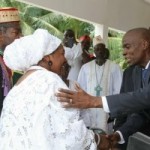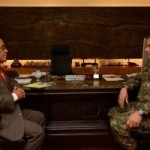Five months after President Michel Martelly took office, Haiti finally has a prime minister, Garry Conille, and a government. A doctor and UN official, Conille, 45, won the vote of confidence in the upper and lower houses of parliament, which had rejected the first two candidates proposed by the president. Martelly, the former musician known as Sweet Micky, has had to come to terms with the opposition, which holds the majority in parliament.
The new prime minister promised to prioritise rehousing the 600,000 disaster victims still in transit camps after the earthquake in January 2010 that claimed more than 220,000 lives. “My government will focus its action on the four main pillars established by President Martelly: education, jobs, the environment and the rule of law,” Conille said. He aims to create 1m jobs and achieve annual growth of “about 9%” over the next five years.
After qualifying as a physician and specialising in gynaecology in Haiti, Conille obtained a master’s in health policy in the US. In the early 2000s he compeered a radio broadcast on sex education, sponsored by USAid. He started his international career in 2004 as a UN Population Fund technical advisor in Ethiopia. In 2006 he moved on to work with Professor Jeffrey Sachs on the Millennium development goals. Following the quake in Haiti, he became the chief of staff of Bill Clinton, in his capacity as special UN envoy and co-chair of the Interim Haiti Reconstruction Commission (IHRC). Conille is married to the daughter of former prime minister Marc Bazin and the father of twins. He had just been appointed UN representative to Niger when Martelly called him in August to offer him the job of prime minister.
His association with the former US president prompted accusations by several opposition MPs of being too close to the international community. His appointment was hailed by the US and French embassies and by the UN Stabilisation Mission in Haiti (Minustah) but drew criticism from farming and trade union organisations, which condemned “growing foreign control and neoliberal policies”.
When asked in the Senate about renewal of the IHRC mandate, Conille gave a guarded reply. “It will need to be rethought and redefined,” he said, in response to critics who asked what had been done with the $4bn in international aid received since the disaster.
Some MPs highlighted his lack of political experience and pointed out that his father, Serge Conille, was a leading figure in the Duvalier regime and close to Roger Lafontant, the head of the tontons macoutes, the dictator’s feared militia.
In September, supporters of the Duvalier regime interrupted an Amnesty International press conference to demand a fair trial for former dictator Jean-Claude Duvalier (Baby Doc), who returned from exile in January. Several members of the team formed by the new president are Duvalier sympathisers and close to the military behind the junta that seized power in the 1990s.
During the debate in parliament Conille dodged questions about plans to re-establish the army recently announced by Martelly. Responsible for several coups and many human rights abuses, it was disbanded in 1995 by President Jean-Bertrand Aristide. Neither Washington nor Paris see re-establishing the army as a priority.
The mandate for the UN Stabilisation Mission in Haiti has been extended for another year, but at reduced strength. To prepare for its final withdrawal, funding agencies prefer to reinforce the police.
 Haïti – Politique : Moïse commémore les 226 ans de la cérémonie de Bois Caïman
Haïti – Politique : Moïse commémore les 226 ans de la cérémonie de Bois Caïman Haïti – RD : Les autorités militaires dominicaines appuient la formation d’une armée en Haïti
Haïti – RD : Les autorités militaires dominicaines appuient la formation d’une armée en Haïti Haïti – AVIS : Moratoire sur l’octroi de fréquences de radio FM
Haïti – AVIS : Moratoire sur l’octroi de fréquences de radio FM Haïti – FLASH : 94 morts par balles pour les 6 premiers mois
Haïti – FLASH : 94 morts par balles pour les 6 premiers mois
Leave a Reply